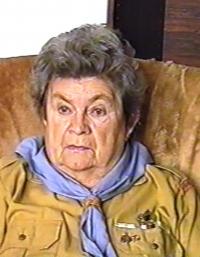I was teaching the girls to be independent – I was glad to have them, and they liked me

Download image
Irena Knotková was born December 1, 1923 in Hradec Králové, where she has lived her entire life. Her parents, the Kulháneks, and her brother, Ota, were all very active Scouts. Irena Knotková joined the Scouts when she was a little girl, and took her oath in 1935. At that time she was a member of Vlasta Macková´s troop. After 1945 she was involved in the restoration of scouting in Hradec Králové and she became the leader of the 2nd unit and of the 5th troop. In 1946 she participated in a meeting with the world Scout leader Lady Olave Baden-Powell in Prague, during her visit to Czechoslovakia. Irena Knotková was working as a healthcare professional in hospital at that time, but she continued to work for the scouting movement in Hradec until it became banned again in 1951. Nevertheless, she still managed to organize a camp in the same year, even after this activity had become illegal. Her brother Ota, who served as a great role-model for her, established a Scout music band in Hradec Králové. With several interruptions, the band was active for many decades, and they also participated on the subsequent restoration of scouting in Hradec Králové in 1968. For all these activities and for her other merits, Irena Knotková - Pineta was invited to become a member of Svojsík´s troop.
